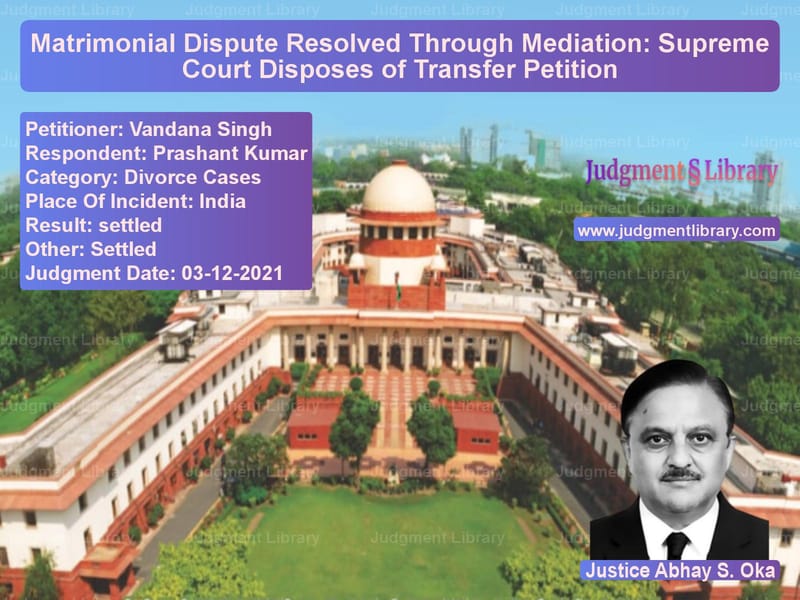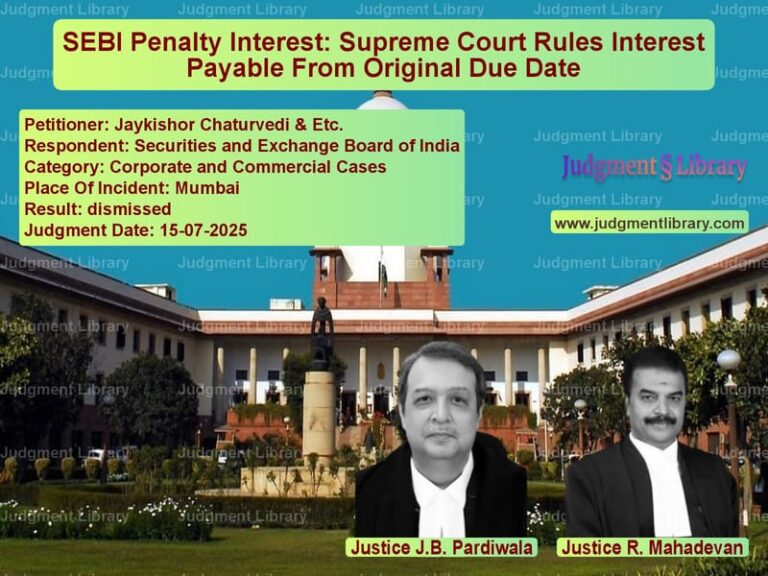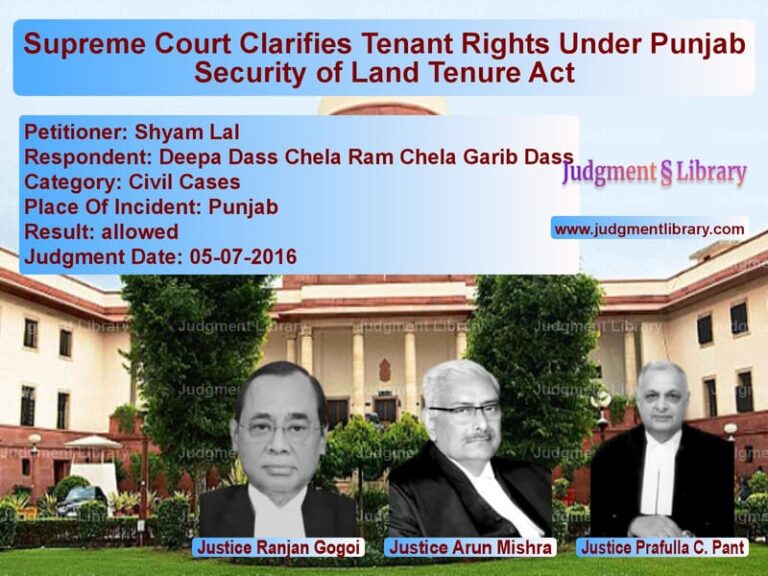Matrimonial Dispute Resolved Through Mediation: Supreme Court Disposes of Transfer Petition
In a significant development, the Supreme Court of India disposed of a transfer petition filed by Vandana Singh against Prashant Kumar in a matrimonial dispute. The case, which initially involved a request for the transfer of legal proceedings from one jurisdiction to another, was resolved amicably through mediation. As a result, the Supreme Court recognized the final deed of settlement signed on February 24, 2021, along with an amendment agreement dated September 28, 2021. This judgment emphasizes the importance of mediation and alternative dispute resolution in matrimonial conflicts, reducing the burden on the judiciary and fostering amicable resolutions.
Background of the Case
The case originated when Vandana Singh, the petitioner, approached the Supreme Court seeking the transfer of a matrimonial dispute to a different jurisdiction. She argued that attending legal proceedings in the existing jurisdiction was inconvenient and unfair, thereby warranting a transfer to a more suitable location. The respondent, Prashant Kumar, opposed the transfer but agreed to engage in mediation, leading to the eventual resolution of the matter.
The case was registered as Transfer Petition (Civil) No. 2092/2019, and after multiple hearings, the Supreme Court referred the matter to the Supreme Court Mediation Centre. Through successful mediation efforts, the parties arrived at a mutually acceptable agreement, leading to the disposal of the transfer petition.
Arguments by the Petitioner
Vandana Singh, through her legal counsel, presented the following arguments:
- The legal proceedings in the current jurisdiction were causing her undue hardship.
- She faced significant logistical and financial difficulties in attending court hearings at the given location.
- The transfer would ensure fair trial proceedings and a neutral environment for adjudication.
- The Supreme Court had the discretion to transfer matrimonial cases to a jurisdiction that would serve the interests of justice.
She sought a directive from the Supreme Court to relocate the case to a jurisdiction where she could participate more effectively.
Arguments by the Respondent
Prashant Kumar, the respondent, countered the petitioner’s claims with the following arguments:
- The current jurisdiction was appropriate and had been handling the case for a considerable period.
- The petitioner’s claims of inconvenience were not substantial enough to warrant a transfer.
- Transferring the case at an advanced stage would cause unnecessary delays and procedural complications.
- The legal system should not be used to obtain a favorable forum but to ensure fair and effective justice.
The respondent, however, agreed to explore mediation as a possible resolution mechanism.
Mediation Process and Settlement
Recognizing the potential for an amicable resolution, the Supreme Court referred the case to its Mediation Centre. Over multiple sessions, the parties engaged in discussions facilitated by court-appointed mediators. Through dialogue and mutual understanding, the parties agreed to resolve their disputes without prolonging litigation.
Read also: https://judgmentlibrary.com/supreme-court-transfers-divorce-case-from-rajasthan-to-gujarat/
The mediation resulted in:
- The signing of a final deed of settlement on February 24, 2021.
- An amendment agreement dated September 28, 2021, clarifying specific terms.
- A mutually agreed-upon resolution regarding financial settlements and other pending matters.
Once the agreements were placed on record, the Supreme Court proceeded to dispose of the transfer petition.
Supreme Court’s Observations and Judgment
The Supreme Court, after reviewing the mediation report and settlement agreements, ruled that the transfer petition had become infructuous. The Court noted:
“The parties signed the final deed of settlement dated 24th February, 2021. An amendment agreement dated 28th September, 2021, to the said final deed of settlement is placed on record by the Supreme Court Mediation Centre.”
Read also: https://judgmentlibrary.com/divorce-case-transfer-supreme-court-allows-wifes-plea-for-convenience-2/
The Court emphasized the following principles:
- Mediation serves as an effective tool for resolving matrimonial disputes without prolonged litigation.
- Courts must encourage amicable settlements to reduce the backlog of matrimonial cases.
- Alternative dispute resolution mechanisms should be promoted to ensure quick and efficient resolutions.
- Both parties voluntarily agreeing to a settlement demonstrates the effectiveness of mediation as a preferred resolution method.
Key Legal Precedents Considered
The Supreme Court’s ruling aligns with several legal precedents that support mediation and alternative dispute resolution in matrimonial cases:
- K. Srinivas Rao v. D.A. Deepa – Stressed the necessity of mediation in matrimonial disputes to reduce litigation burden.
- Amit Kumar v. Sonal Mehrotra – Held that mediation should be the first step in resolving family law disputes.
- Himangni Enterprises v. Kamaljeet Singh Ahluwalia – Reinforced that courts should prioritize out-of-court settlements where feasible.
Implications of the Judgment
The Supreme Court’s decision in this case underscores the judiciary’s commitment to promoting mediation as a preferred dispute resolution mechanism. The implications of this ruling include:
- Encouragement of Mediation: The judgment reinforces the importance of mediation in resolving matrimonial disputes.
- Reduction in Litigation Burden: Encouraging settlements helps reduce the backlog of matrimonial cases in courts.
- Speedy Resolution of Disputes: Mediation offers a faster and less adversarial process compared to lengthy court battles.
- Judicial Recognition of Amicable Settlements: Courts are willing to accept and uphold mediated settlements as valid resolutions.
Final Verdict
The Supreme Court’s decision to dispose of the transfer petition based on an amicable settlement marks a significant step towards promoting alternative dispute resolution in matrimonial cases. By recognizing the mediated agreement between Vandana Singh and Prashant Kumar, the Court demonstrated its commitment to fostering mutual understanding over adversarial litigation.
This ruling serves as a valuable precedent for future matrimonial cases, highlighting the benefits of resolving disputes through mediation rather than prolonged courtroom battles. The Supreme Court’s emphasis on mediation as a mechanism for resolving disputes ensures that parties reach fair and mutually beneficial agreements without unnecessary legal confrontations.
Petitioner Name: Vandana Singh.Respondent Name: Prashant Kumar.Judgment By: Justice Abhay S. Oka.Place Of Incident: India.Judgment Date: 03-12-2021.
Don’t miss out on the full details! Download the complete judgment in PDF format below and gain valuable insights instantly!
Download Judgment: vandana-singh-vs-prashant-kumar-supreme-court-of-india-judgment-dated-03-12-2021.pdf
Directly Download Judgment: Directly download this Judgment
See all petitions in Mutual Consent Divorce
See all petitions in Alimony and Maintenance
See all petitions in Judgment by Abhay S. Oka
See all petitions in settled
See all petitions in settled
See all petitions in supreme court of India judgments December 2021
See all petitions in 2021 judgments
See all posts in Divorce Cases Category
See all allowed petitions in Divorce Cases Category
See all Dismissed petitions in Divorce Cases Category
See all partially allowed petitions in Divorce Cases Category







